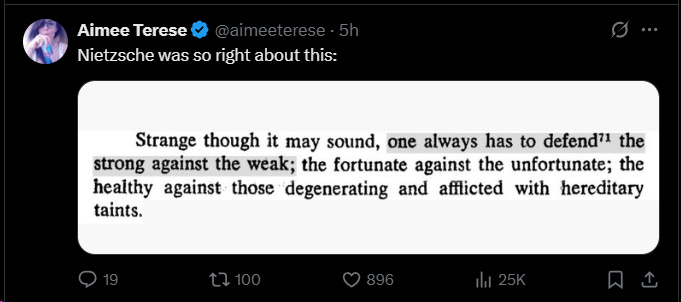Defending The Strong
A Nietzschean critique of modern egalitarianism
Nietzsche famously—and provocatively—argued that "one always has to defend the strong against the weak." At face value, this appears shocking or ethically dubious, but understood metaphorically, it provides an insightful critique of modern societal trends.
Today's culture frequently positions victimhood and suffering as moral virtues, granting social authority and moral high ground to those who identify as oppressed or disadvantaged. Sociologists Bradley Campbell and Jason Manning have termed this "victimhood culture," in which status is increasingly gained through perceived vulnerability. Nietzsche would argue that this creates harmful incentives, encouraging people to emphasize their own weaknesses or grievances rather than their strengths, resilience, and accomplishments. Over time, this risks stigmatizing success and achievement as oppressive or unjustly privileged.
Nietzsche’s critique applies directly to current egalitarian impulses as well. He was critical of the drive toward equality of outcomes rather than equality of opportunity, seeing it as potentially detrimental to human potential and excellence. In modern discourse, policies motivated by resentment (ressentiment, as Nietzsche termed it) frequently focus less on genuinely uplifting the disadvantaged and more on diminishing those perceived as strong or privileged. Phenomena such as "cancel culture," social-media shaming, and punitive political correctness exemplify a resentment-based morality that seeks primarily to punish excellence or independence rather than genuinely assist those in need.
Educational and institutional practices that emphasize emotional safety and comfort at the expense of intellectual rigor and resilience also align with Nietzsche's critique. The widespread adoption of trigger warnings and safe spaces, intended to protect individuals from challenging ideas, may ultimately infantilize them, depriving them of the opportunity to develop strength, critical thinking, and resilience.
Additionally, Nietzsche's perspective resonates in debates surrounding meritocracy and identity-based preferences. Policies that prioritize group identities over individual competence or merit, while aiming for fairness, can inadvertently undermine institutional effectiveness by sidelining talent and achievement. Nietzsche would warn that compromising meritocratic standards for identity considerations risks weakening society's overall capability and potential.
Ultimately, Nietzsche's provocative assertion is less a callous dismissal of compassion than a powerful warning against moral frameworks shaped primarily by envy, resentment, or victimhood (aka critical social justice). He challenges modern society to critically evaluate the values we champion, cautioning us against reflexively equating weakness or suffering with virtue. To Nietzsche, a culture that genuinely defends excellence, strength, and resilience—rather than stigmatizing them—is essential for long-term human flourishing and advancement.



